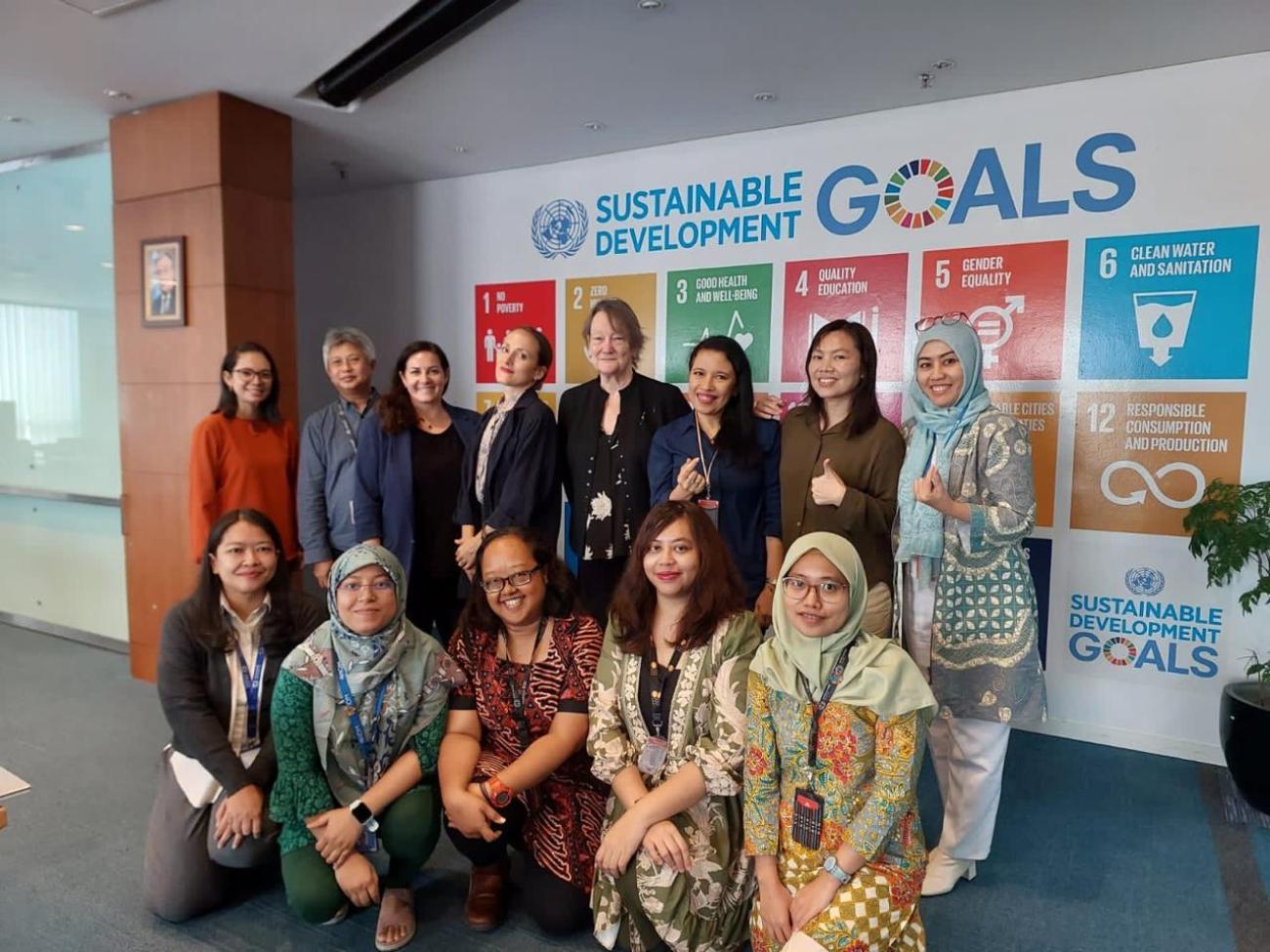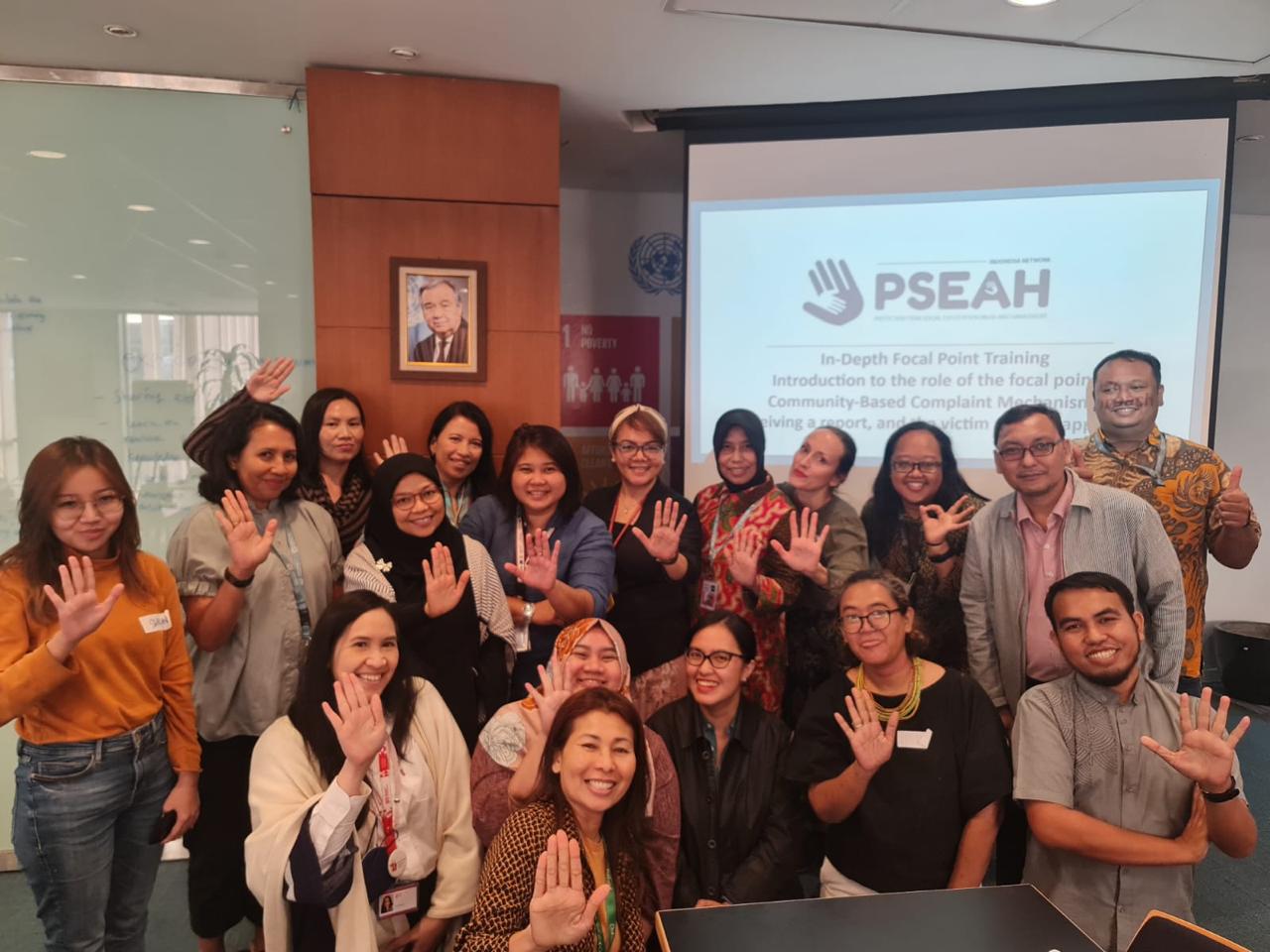Towards a safer world for all: UN in Indonesia tackles prevention of sexual misconduct

Greater instances of sexual misconduct being reported in 2023. Approximately, 500+ UN staff members trained on protection from sexual exploitation, abuse and sexual harassment. The launch of the UN’s victim-centered approach to the issue. These are just some of the results of the UN in Indonesia’s efforts for a safer world for all.
How did we get here?
At first thought, sexual exploitation and abuse (SEA) is often associated with chaotic and fast-paced conflict or disaster settings. Over the years there has been a realization, however, that although crisis settings do indeed increase the risk of SEA occurring, work on prevention and protection is necessary in development contexts wherever the UN and its partners work, as well.
This is why the UN in Indonesia has invested heavily over the past two years to address all forms of sexual misconduct, including sexual exploitation abuse and sexual harassment under my leadership as the Resident Coordinator, with the UN Country Team and supported by a full time coordinator for protection from sexual exploitation, abuse and sexual harassment (PSEAH).
In 2019, in the wake of the Central Sulawesi earthquake and tsunami response, which involved significant operations from several UN agencies working with vulnerable communities, we set up a task force to prevent and address sexual exploitation and abuse.
Since then, the UN Country Team has taken major steps to institutionalize and integrate PSEA, as well as combatting sexual harassment, into the work of the UN in Indonesia, and our efforts are bearing fruit. A victim-centered approach ensuring appropriate, safe, timely and accessible services for survivors is being implemented to address the issue, with greater awareness and more than 500 staff members having been trained, till date. Protection measures help ensure sexual misconduct is reported and dealt with promptly.
Three pillars of Prevention
We have engaged with personnel through three main approaches:
First, we established a 43-member strong PSEAH Network involving all UN agencies through their respective PSEAH focal points. Building such a network ensures that in every agency, there is a dedicated ally for victims and witnesses to confide in, who can also help raise awareness, share ideas and build capacity systematically. Later, we expanded the network to also include members from civil society organizations working with the UN in both, development and humanitarian contexts. We, then, jointly developed a Multi-Year PSEAH Strategy (2022-2025).
The Strategy prioritizes setting up easy and accessible reporting mechanisms, raising awareness of staff member who may be victims and witnesses and ensuring standards and confidentiality of processes are respected.

The second approach is staff engagement. Over the past two years, I have chaired 6 town hall meetings for all UN personnel in Indonesia on this issue. Initially starting out as information sharing and sensitization sessions, our most recent events were driven by the insightful and critical questions submitted by staff. We have tried to address concerns around retaliation, lack of trust in the system and investigations procedures by bringing guest speakers such as Under-Secretary General Christian Saunders, the UN Ethics Office and misconduct investigators.
The PSEAH Coordinator and agency focal points have also conducted many trainings. Focus group discussions dug deeper into understanding concerns and complex situations. The PSEAH coordinator has weekly virtual and in-person drop-in hours for anyone who wishes to raise a question or discuss a concern. Staff can access additional information on a microsite on PSEAH available in English and Indonesian. The microsite also allows for direct reporting of incidents.
Thirdly, we have invested in setting up systems and institutionalized mechanisms that ensure the sustainability of these efforts. This includes the formulation of PSEAH standard operating procedures on how to refer SEAH complaints, including a dedicated chapter on victims’ rights.
We have learned that working on PSEAH is a long-term investment. It is about gaining and maintaining trust from all UN personnel and fostering accountability. We have now begun receiving reports on sexual exploitation, abuse, and sexual harassment as well as on gender-based violence. This indicates that what we are doing is working, victims are aware of their rights and of the confidential reporting channels available to them. Investigations into these allegations are ongoing with the involvement of the relevant agencies.
With the basic building blocks of PSEAH now in place, we are turning our focus to victims’ rights. Victims’ Rights Advocate Assistant Secretary General Jane Connors visited Indonesia late last year and conducted a tabletop training event on victims’ rights with the UN Country Team, and disseminated the new Victims’ Rights Statement to all staff.

The Way Forward
In 2024, we are working to expand and regionalize the PSEAH Network, to ensure a wider reach mirroring the extent of the UN’s presence countrywide. We are also looking to work with government actors to operationalise community-based complaints mechanisms and ensure that no complaint goes unanswered.
We must strive to create and maintain an environment which consistently prevents and responds to SEAH, using a victim-centred, gender-responsive, and inclusive approach. Leadership at the UN and in humanitarian and development organizations must continue to demonstrate that we ‘’walk the talk’’ when it comes to sexual exploitation, abuse and harassment.
This blog was written by the UN Resident Coordinator in Indonesia from October 2020 until March 2024 Valerie Julliand. For more information about the UN's work in Indonesia, visit indonesia.un.org.













